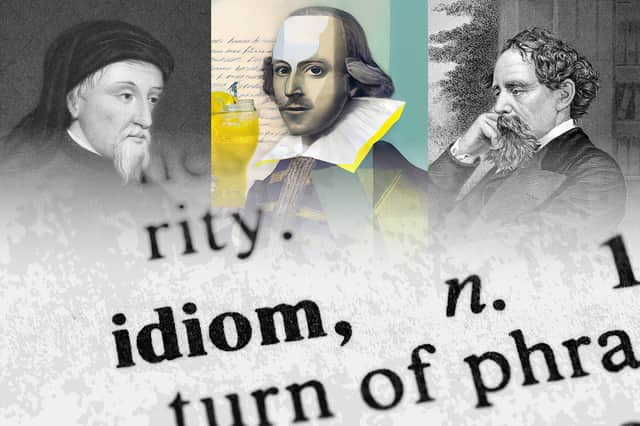Idioms in literature: 12 phrases taken from books, plays and famous authors including Shakespeare and Chaucer
These phrases still commonly used today were penned by some iconic authors - some hundreds of years ago
and live on Freeview channel 276
Some of the most iconic pieces of literature have survived hundreds of years and are read generation after generation, as well as being analysed as part of our education system. Most people will know the tale of ill-fated lovers Romeo and Juliet from the Shakespeare play of the same name, for example, and also the tragic friendship of George and Lenny in John Steinbeck’s Of Mice and Men.
While these works of art are remembered for their unique characters, bold themes and emotional situations, they also gave us something else that has stood the test of time - well-loved idioms. An idiom is an expression which has a meaning which is not immediately apparent from the literal meaning of the individual words, but it is universally understood because it is commonly used.
Advertisement
Advertisement
Now, you may be wondering exactly which idioms came from these two famous pieces of work. NationalWorld reveals the answer below, along with 10 other idioms created by fiction authors.
For even more interesting language related stories, be sure to check out our dedicated words and meanings page. There, you’ll find plenty more stories explaining the fascinating origins of some of our favourite idioms including 7 famous idioms that relate to celebrities - from household name to one hit wonder, and also 12 idioms and phrases that young people and kids may not understand, plus 12 idioms with unexpectedly sinister origins.
Break the ice
Origin: This comes from Shakespeare’s Taming the Shrew. In the play, Tranio encourages Petruchio to "break the ice" with Katherine to get to know her, suggesting that he may like her better if he knows more about her.
Meaning: To do or say something to relieve the tension or awkwardness in a social situation.
Wear my heart upon my sleeve
Advertisement
Advertisement
Origin: This saying comes from the Shakespeare play Othello when Iago describes how he would be vulnerable if he revealed his dislike of Othello.
Meaning: To reveal true emotions and be very honest about thoughts and feelings.
There’s method in my madness
Origin: In Shakespeare’s Hamlet, Polonius observes Hamlet's antics and says: "Though this be madness, yet there is method in't." He is saying that he suspects Hamlet may appear to be behaving irrationally on the surface, but he has a good reason for this.
Meaning: There’s a good reason for a person’s actions even though it’s not obvious what they are at first and they may appear to be behaving in a strange way.


Dead as a doornail
Advertisement
Advertisement
Origin: This phrase is used as a description of Ebenezer Scrooge's partner Jacob Marley in Charles Dickens’ A Christmas Carol.
Meaning: Something that is definitely dead and has no chance of revival. This idiom doesn’t always refer to something or somebody which has literally died, but also metaphorically too.
Wild goose chase
Origin: In Shakespeare’s Romeo and Juliet, Mercutio and Romeo are speaking about going on a wild goose chase.
Meaning: A fruitless activity, which will ultimately serve no purpose and usually also takes a significant amount of time to carry out.
The world is my oyster
Advertisement
Advertisement
Origin: This comes from Shakespeare’s The Merry Wives Of Windsor. When Falstaff refuses to lend Pistol money, Pistol responds by drawing his sword and saying: "Why, then the world's mine oyster, which I with sword will open.”
Meaning: You can do anything you like or go anywhere you want.
Green eyed monster
Origin: Another phrase from Shakespeare’s Othello. Iago says “O, beware, my lord, of jealousy! It is the green-eyed monster, which doth mock the meat it feeds on.”
Meaning: Someone who has been bitten by the green eyed monster is said to be jealous of someone else.
Heart of gold
Advertisement
Advertisement
Origin: This phrase comes from the Shakespeare play Henry V. Discussing the character of the King, Pistol says “The king’s a bawcock, and a heart of gold, a lad of life, an imp of fame, of parents good, of fist most valiant.”
Meaning: A person who has a heart of gold is said to be extremely kind and generous.
Set my teeth on edge
Origin: In Henry IV, Part 1, also by Shakespeare, Hotspur complains about how much he hates poetry, saying, "And that would set my teeth nothing an edge, nothing so much as mincing poetry."
Meaning: If something has set your teeth on edge it means you find something extremely annoying.
Love is blind
Advertisement
Advertisement
Origin: This idiom is written in Chaucer’s The Canterbury Tales. He wrote: “For love is blind all day, and may not see.”
Meaning: The phrase has a couple of different, but linked, meanings. The first is that if people are in love with someone they cannot see their faults. The second is that true love is not based on looks and can be unexpected.
Live off the fat of the land
Origin: The phrase is famously used in John Steinbeck's novel Of Mice and Men. George tells Lenny they'll live off the fat of the land and have rabbits when they make enough money which means they no longer have to work.
Meaning: To live the best possible life without having to work hard.
Mad as a hatter
Advertisement
Advertisement
Origin: The expression is well known thanks to author Lewis Carroll, who wrote about a Mad Hatter character in his book Alice’s Adventures in Wonderland. It is linked to the hat-making industry and mercury poisoning which caused workers to behave in strange ways.
Meaning: Someone who behaves in an erratic and unpredictable way.
Comment Guidelines
National World encourages reader discussion on our stories. User feedback, insights and back-and-forth exchanges add a rich layer of context to reporting. Please review our Community Guidelines before commenting.
